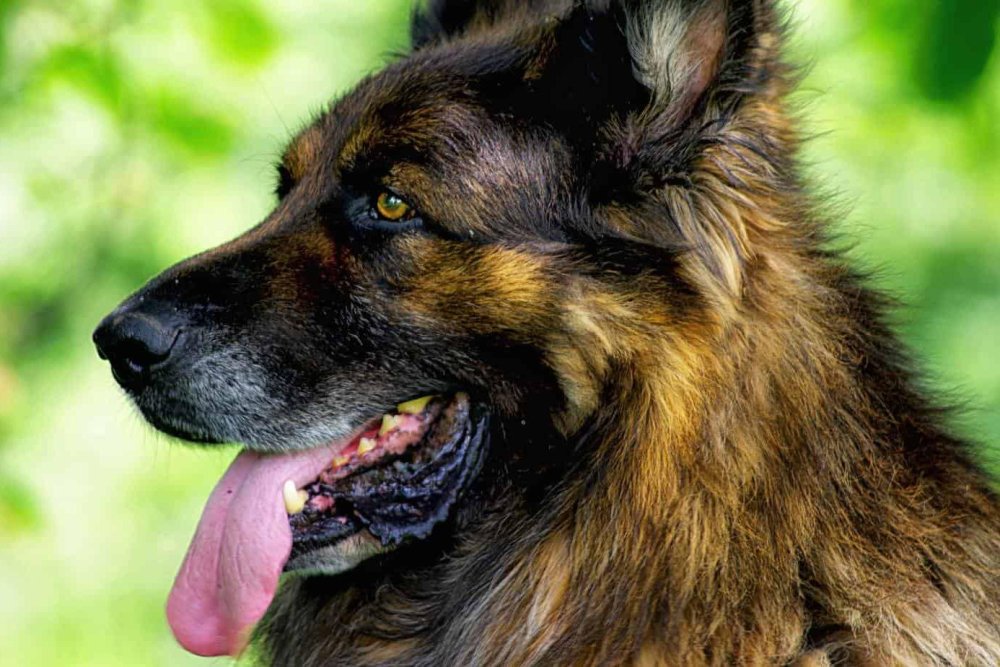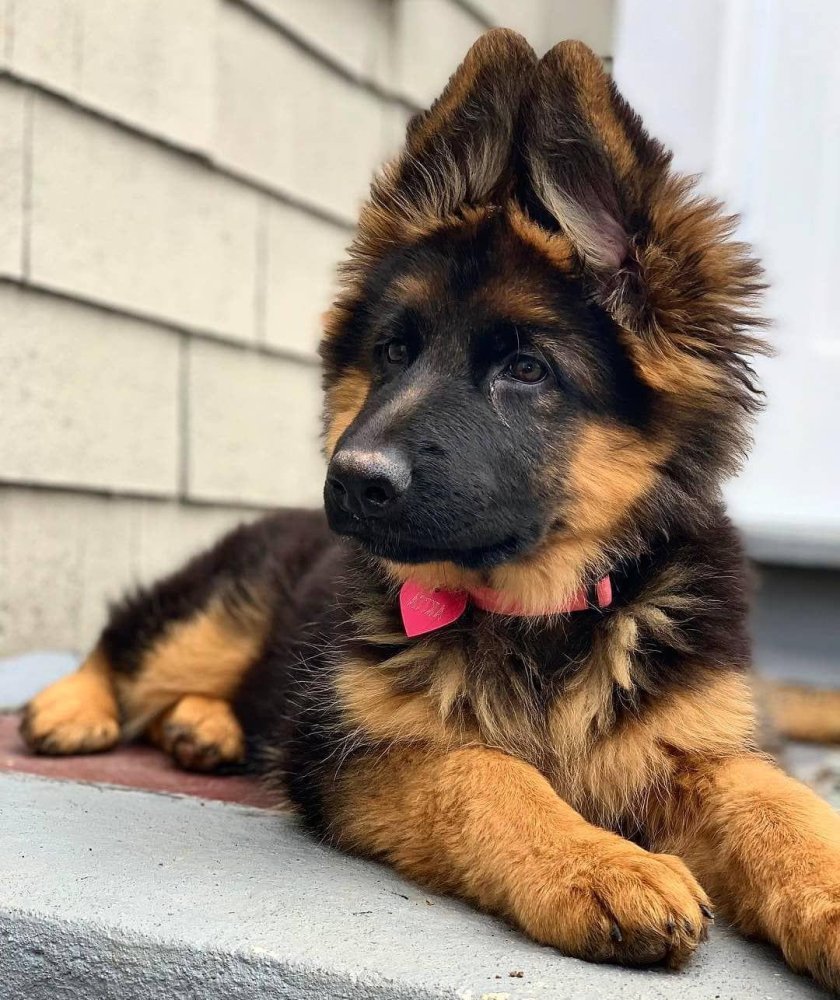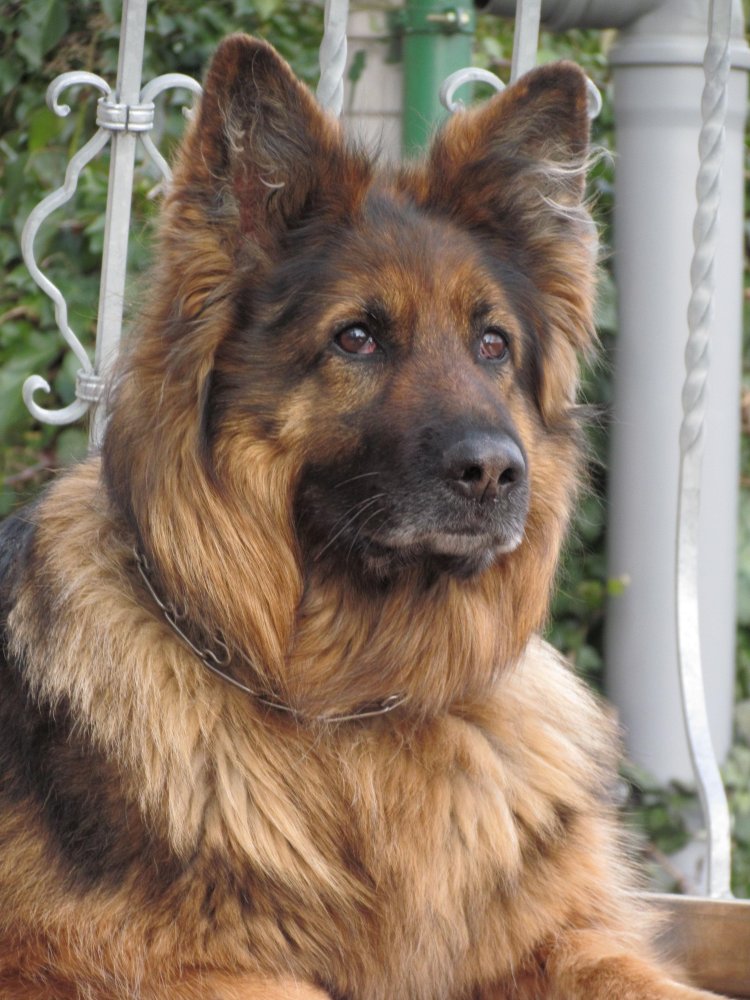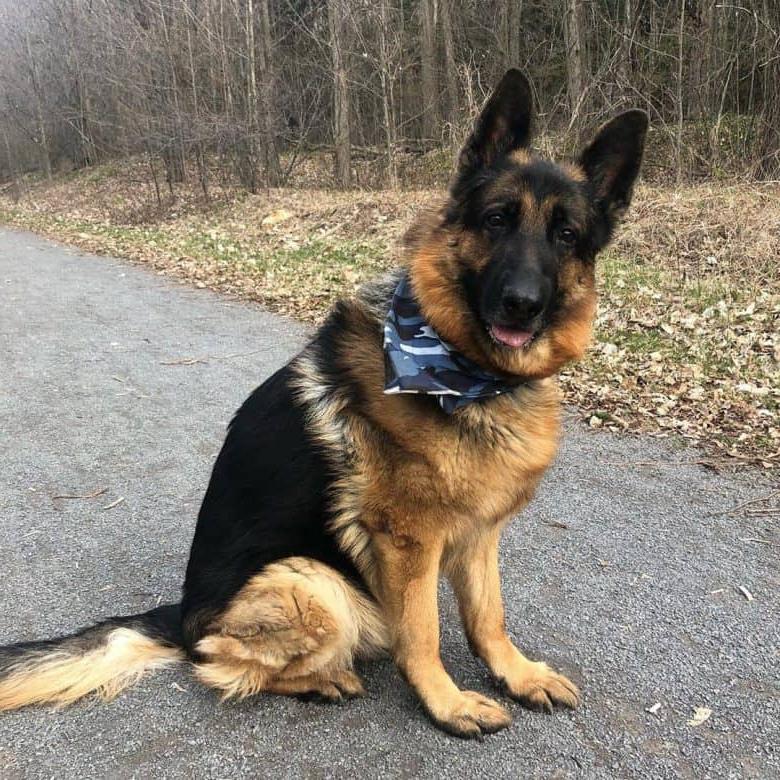- Breed Category: Working dog
- Country of Origin: United States
- Average Height: Males 66-76 cm, Females 63-71 cm
- Average Weight: Males 41-68 kg, Females 34-50 kg
- Average Life Span: 10-11 years
- Grooming Requirements: Moderate, regular brushing needed
- Exercise Requirements: High, needs daily exercise
- Coat Type: Double coat, dense
- Coat Color Variations: Black, sable, tan, bi-color
- Shedding Level: High, seasonal shedding
- Ear Type: Erect, triangular
- Tail Type: Bushy, slightly curved
- Temperament: Loyal, protective, intelligent
- Intelligence Level: Very high
- Barking Tendency: Moderate, alert barking
- Compatibility with Children: Very good, gentle and protective
- Compatibility with Other Pets: Good with proper socialisation
- Training Ease: Easy, eager to learn
- Common Health Issues: Hip dysplasia, elbow dysplasia
- Dietary Needs: High-quality, balanced diet
- Energy Level: High, active and energetic
- Drooling Tendency: Low
- Sensitivity to Weather: Tolerates cold, sensitive to heat
- Overall Maintenance Level: Moderate to high
- Original Purpose: Herding, protection
- Year of Recognition by Kennel Clubs: Not officially recognised
- Apartment Friendly: Not ideal, needs space
- Best Suited For: Active families, large yards
- Cost of Ownership: Moderate to high
- Unique Traits: Larger than German Shepherds
“The King Shepherd is not just a dog; it’s a majestic blend of strength, intelligence, and loyalty.”
Welcome to the world of the King Shepherd, a breed that stands out with its impressive stature and gentle nature. Originating from a mix of German Shepherds and other breeds like the Alaskan Malamute, the King Shepherd is known for its protective instincts and friendly disposition. This article aims to give you a closer look at what makes this breed unique. We’ll explore their characteristics, delve into their history, and provide insights into their care. Whether you’re considering adding one to your family or just curious, you’ll find everything you need to know right here.
History and Origin

The King Shepherd is a relatively new breed, developed in the United States during the 1990s. It was created by crossing German Shepherds with other breeds like the Alaskan Malamute and the Great Pyrenees. The goal was to produce a larger, more robust dog with a gentle temperament. This breed was designed to be a versatile working dog, capable of herding and protection, while also being a loyal family companion.
Development and Role
King Shepherds have a natural instinct for herding, making them excellent at managing livestock. Their protective nature also makes them ideal for guarding properties and families. They are known for their intelligence and trainability, which allows them to excel in various roles, from search and rescue to therapy work.
Key Figures in the Breed’s Creation
Key breeders like Shelley Watts-Cross and David Turkheimer played significant roles in the development of the King Shepherd. Their dedication to refining the breed’s characteristics has helped establish the King Shepherd as a distinct and respected breed. Their work focused on enhancing the dog’s size, strength, and temperament, ensuring it remains a reliable and loving companion.
Physical Characteristics
Appearance
King Shepherds are truly a sight to behold. They are large dogs, often weighing between 34 to 68 kilograms, with a height ranging from 63 to 76 centimetres at the shoulder. Their size alone commands attention, but it’s their coat that adds to their majestic presence. Typically, their coat is dense and can be straight or slightly wavy, coming in a variety of colours like sable, black, and tan. Some even have distinctive markings that make each dog unique.
Unique Physical Traits
One of the standout features of the King Shepherd is its strong, muscular build. This breed is designed for endurance and power, making them excellent working dogs. Their broad chest and sturdy legs give them a robust appearance, while their expressive eyes and erect ears add to their alert and intelligent look. These physical traits not only contribute to their striking appearance but also to their capabilities as versatile companions.
Temperament and Behaviour

Typical Personality Traits
King Shepherds are known for their loyalty, intelligence, and high energy levels. These dogs are incredibly devoted to their families, often forming strong bonds with their owners. Their intelligence makes them quick learners, which is a huge plus when it comes to training. They thrive on mental stimulation and physical activity, so they’re always up for a challenge or a game.
Suitability as a Family Pet and Working Dog
As family pets, King Shepherds are hard to beat. They’re gentle giants, protective yet friendly, making them great companions for families. Their working dog roots mean they’re also excellent in roles that require focus and dedication, like search and rescue or therapy work. They’re versatile and adaptable, fitting well into both family life and work environments.
Interaction with Children and Other Animals
King Shepherds generally get along well with children, thanks to their patient and gentle nature. They’re protective but not aggressive, making them a safe choice for families with kids. When it comes to other animals, early socialisation is key. With the right introduction, they can coexist peacefully with other pets, although their herding instincts might kick in from time to time.
Training and Exercise Needs

Importance of Early Training and Socialisation
Getting a head start on training and socialisation is crucial for King Shepherds. These dogs are naturally intelligent and eager to learn, but early exposure to different environments, people, and other animals helps shape them into well-rounded adults. It’s all about setting the foundation for a confident and adaptable dog.
Recommended Training Techniques
Positive reinforcement is the way to go with King Shepherds. They respond well to praise, treats, and playtime as rewards. Consistency is key, so keep training sessions regular but short to maintain their interest. Incorporating fun activities like agility or obedience games can make learning enjoyable for both you and your dog.
Daily Exercise Requirements and Activities They Enjoy
King Shepherds are active dogs that need plenty of exercise to stay happy and healthy. Aim for at least an hour of physical activity each day. They love long walks, hikes, and even a good run. Engaging them in activities like fetch or frisbee can also help burn off energy while strengthening your bond.
Health and Lifespan

Common Health Issues
King Shepherds are generally healthy, but like any breed, they can be prone to certain health issues. Hip and elbow dysplasia are common concerns due to their size. Regular vet check-ups can help catch these early. They might also face issues like bloat, so it’s important to monitor their diet and eating habits.
Average Lifespan and Health Tips
With proper care, King Shepherds typically live between 10 to 11 years. Keeping them healthy involves a balanced diet, regular exercise, and mental stimulation. These dogs thrive on activity, so keeping them engaged is key to their well-being.
Preventative Care Recommendations
- Regular vet visits for check-ups and vaccinations.
- Maintain a healthy diet to prevent obesity and related issues.
- Daily exercise to keep them fit and mentally stimulated.
- Dental care is important, so consider regular teeth cleaning.
- Monitor for signs of joint issues, especially as they age.
Grooming and Maintenance

Coat Care and Grooming Routines
King Shepherds boast a thick, luxurious coat that requires regular attention. A good brushing two to three times a week helps keep their coat healthy and free of tangles. This routine not only maintains their appearance but also strengthens your bond with them. Use a slicker brush or an undercoat rake to reach through their dense fur, ensuring you remove loose hair and prevent matting.
Shedding and Seasonal Grooming Tips
These majestic dogs are known to shed, especially during seasonal changes. Expect heavier shedding in spring and autumn as they transition between their winter and summer coats. During these times, daily brushing can help manage the extra hair and keep your home cleaner. Bathing should be occasional, as over-washing can strip their coat of natural oils. When you do bathe them, use a gentle dog shampoo to maintain their skin’s health.
Diet and Nutrition
Nutritional Needs for Optimal Health
Feeding your King Shepherd the right diet is crucial for their health and vitality. These large, active dogs need a balanced diet rich in protein to support their muscle mass and energy levels. Look for high-quality dog food that lists meat as the first ingredient. Omega-3 and omega-6 fatty acids are also important for maintaining a healthy coat and skin.
Foods to Include and Avoid
Include lean meats, fish, and vegetables in their diet. Whole grains like brown rice and oats can provide necessary carbohydrates. Avoid foods high in fillers, artificial preservatives, and excessive fats. Chocolate, onions, and grapes are toxic to dogs and should be kept out of reach.
Feeding Schedules and Portion Recommendations
Establish a consistent feeding schedule to help regulate their digestion and energy levels. Adult King Shepherds typically do well with two meals a day. Portion sizes depend on their age, weight, and activity level, so consult your vet for personalised advice. Always provide fresh water to keep them hydrated.
Fun Facts and Trivia

Interesting Tidbits about the Breed
King Shepherds are not just about looks; they have some fascinating traits. Did you know they are often mistaken for their German Shepherd cousins? However, King Shepherds are generally larger and have a more laid-back temperament. They were specifically bred to be gentle giants, making them perfect for families. Their intelligence is another standout feature, often ranking high in canine IQ tests. This makes them not only easy to train but also great problem solvers.
Famous King Shepherds in Media or History
While King Shepherds might not be as famous as some other breeds, they have made their mark. In the world of search and rescue, these dogs have been heroes, saving lives with their keen senses and determination. They’ve also appeared in various TV shows and movies, often cast for their striking appearance and ability to perform complex tasks on command. Their versatility and charm make them a favourite choice for roles that require both strength and sensitivity.
Final Thoughts

The King Shepherd is a majestic blend of strength and loyalty. This breed offers a unique combination of protective instincts and gentle nature, making it an ideal companion for active families. While they require commitment in terms of exercise and grooming, the rewards of owning a King Shepherd are immense, from their unwavering loyalty to their impressive versatility. Embrace the journey of raising a King Shepherd, and you’ll find a devoted friend and guardian. Consider welcoming this remarkable breed into your life, and experience the joy and companionship they bring.
